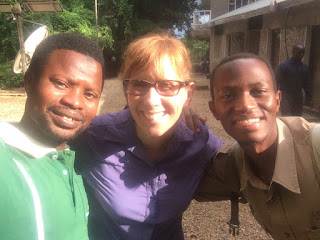After several days of traveling and several
days of recuperation, some words have come back to me. It is way too early to
be up right now, and I’m still mildly jet lagged, but I’ll do the best I can to
write some closing thoughts.
It’s going to be a long time while Luis and I
process everything we’ve experienced. Luis prefers to write about his own
experiences, so look for his account of climbing Kili, oh, in about July.
Kidding! I’m kidding. Sort of.
It may sound stereotypical, but fire and
water have been recurring themes during our trip to Tanzania. I don’t mean it
in some primitive way, although I do mean it in sort of an essential way. Let
me see if I can parse this out.
We forget, living in the city, that fire and
water are the foundation of everything. While traveling, however, especially in
a place where you are witnessing whole ecosystems, such as in the Serengeti, it
becomes apparent that these are the engines that drive the system. It is simple
and beautiful.
·
As safari guests, we saw recently
burned grasses that had come back bright green in Ngorongoro Crater, providing
nourishment to grazing animals. We saw how the pools drew animals of all kinds.
·
As visitors to the lodges and
camps, I sat in awe as a Maasai man made fire for me with just the tools and
trees at hand. We relied on an endless supply of bottled water in order to stay
healthy.
·
On the mountain, Luis relied on
an army of porters to collect, filter, boil, and carry water and all of the
supplies up and down the mountain for their needs, and to make fire in freezing
conditions for daily hot food and warm drinks. Luis battled his own fears of
hiking on snow and ice to reach the top of the tallest freestanding mountain in
the world.
·
At Gombe Forest Camp, every
evening the staff would ask “Are you ready for a fire now, Miss Laura?” and
make a bonfire while we sat and enjoyed the beauty of Lake Tanganyika.
So many of our experiences are directly
linked to fire and water in ways that are indirect, convenient, or invisible
back at home.
OK, now on to…10 Things I learned while
traveling in Tanzania:
1.
Wear your Maasai bracelet on the
left since the right arm is your spear arm.
2.
If you are a breasted person
going on safari, there are only two important words: Sports. Bra.
3.
Everyone has facebook, including
the Maasai and all the members of your remote tented camp.
4.
While preparing to visit the
chimps at Gombe, you must do WAY more stair climbing exercises than you think
are necessary. Preferably in humidity while wearing a backpack.
5.
Always choose the Warrior with
the lion’s tail for a date.
6.
Beyoncé is internationally loved.
7.
If the hotel desk staff person
asks to marry your daughter, hold out for three cows and at least two goats, or
no deal.
8.
Not having wi-fi can be a
blessing.
9.
Every time you see a warthog in
the Serengeti you must resist the urge to sing “I was a young wartHOGGGG”
because once is really enough.
10. Talk to everyone you can. They are interesting and smart and different
from you.
I’ve come to
the conclusion that traveling, like fire and water, is also essential. Traveling
requires an open mind and a willingness to feel slightly uncomfortable. Traveling
is not tourism, in which you are insulated from the realities. Traveling is basically
a Buddhist practice, in which “not knowing” is a daily state. These slightly uncomfortable
moments are the ones when I’ve become a better person, more connected to the
rest of the species and less self-centered.
I wish I was
able to step even more off the beaten path, but risks are, well, riskier as a
woman. But every time I’ve ventured a little farther, or asked deeper
questions, tasted something new, ridden in some vehicle that just shouldn’t be
legal, or gotten to know someone I would never cross paths with in my usual
daily routine, I have grown. Far more than souvenirs, it’s these moments that
make traveling essential.
Thank you
for reading! It was nice knowing you were listening.












